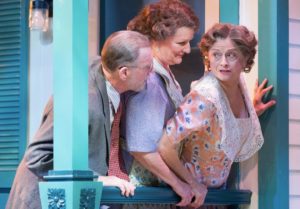In today’s Wall Street Journal drama column, I review a Philadelphia-area revival of Paul Osborn’s Morning’s at Seven. Here’s an excerpt.
* * *
Paul Osborn’s “Morning’s at Seven,” the story of four sisters on the near shore of old age whose lives haven’t worked out the way they planned, is a great American play that ought to be far better known than it is—though the fact that it’s still known at all is surprising enough.
The original 1939 Broadway production of “Morning’s at Seven” closed after just 44 performances. But the play continued to be performed from time to time, first on radio and then on TV, and in 1980 it received a Broadway revival that ran for 16 months, introducing a new generation to Osborn, who by then was remembered solely for his adaptations (he wrote the screenplays for “East of Eden” and “South Pacific”). Two decades later, Lincoln Center Theater brought “Morning’s at Seven” back to Broadway again, this time in an all-star version featuring Frances Sternhagen, Estelle Parsons, and Christopher Lloyd that received rave reviews.
 The combined effect of these productions, however, wasn’t as lasting as it should have been, and while “Morning’s at Seven” is still mounted on occasion by amateurs and small regional troupes, I’d never had the opportunity to see it, much less review it, until People’s Light’s revival opened last weekend in suburban Philadelphia. It was worth the trip: This staging, performed by a sterling cast drawn from the company’s resident ensemble and directed with all-encompassing sensitivity by Abigail Adams, the company’s artistic director, is distinguished in every way.
The combined effect of these productions, however, wasn’t as lasting as it should have been, and while “Morning’s at Seven” is still mounted on occasion by amateurs and small regional troupes, I’d never had the opportunity to see it, much less review it, until People’s Light’s revival opened last weekend in suburban Philadelphia. It was worth the trip: This staging, performed by a sterling cast drawn from the company’s resident ensemble and directed with all-encompassing sensitivity by Abigail Adams, the company’s artistic director, is distinguished in every way.
Part of what makes “Morning’s at Seven” so good—and so tricky to stage—is that it’s not what it seems to be. At first glance it looks like an old-fashioned farce about an ingrown small-town family whose members have spent a lifetime coddling their quaint and comfy crotchets. But it soon becomes clear that the eccentricities of the four Gibbs sisters (Alda Cortese, Carla Belver, Janis Dardaris and Marcia Saunders) and their three spouses (Peter DeLaurier, Stephen Novelli and Graham Smith), far from being benign, are in fact the outward manifestations of their shared fear that they’ve wasted their lives. And while “Morning’s at Seven” is full of laughs, many of the best jokes turn out on closer inspection to be cries of pain and doubt….
The secret to making a play like “Morning’s at Seven” work is to perform it without the slightest trace of self-consciously comic exaggeration, letting the laughs come naturally instead of forcing them on the audience like cards in a trick. That’s just what Ms. Adams and her actors have done…
* * *
Read the whole thing here.
The Theater Guild on the Air radio version of Paul Osborn’s Morning’s at Seven, starring Shirley Booth and Aline MacMahon, originally broadcast by NBC on November 25, 1945:


